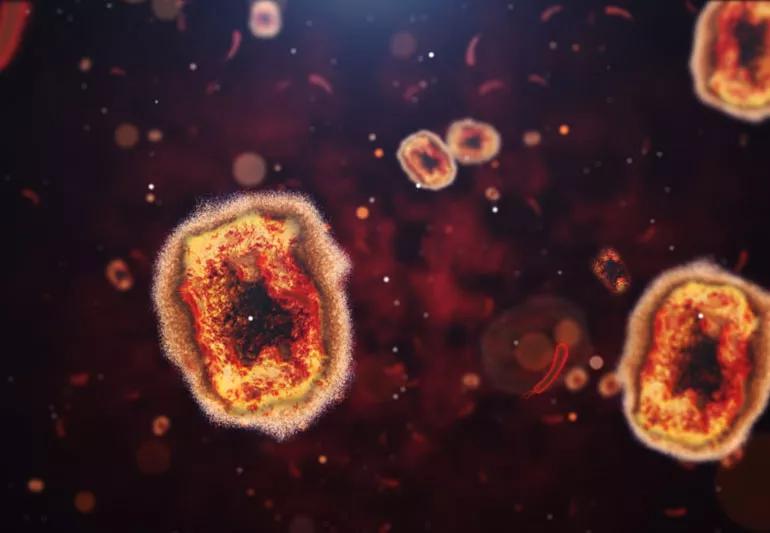Mpox (monkeypox) is transmitted through skin-to-skin contact, including sex

Image content: This image is available to view online.
View image online (https://assets.clevelandclinic.org/transform/16dc9e4c-55a1-4896-b559-fc1d688b4470/monkeypoxVirus-1399817437_770x533_jpg)
monkeypox virus
A recent outbreak of mpox (formerly known as monkeypox) has researchers questioning how the virus spreads. Once rarely seen outside of Africa, this disease is similar to smallpox. As of June 17, 2022, there have been more than 2,520 cases across 37 countries where the virus isn’t normally seen, according to the Centers for Disease Control and Prevention (CDC). Because it’s traveled far beyond its presumed initial origins, and in an effort to destigmatize the virus’s connection to Africa, the World Health Organization (WHO) is in the process of determining a name change.
Advertisement
Cleveland Clinic is a non-profit academic medical center. Advertising on our site helps support our mission. We do not endorse non-Cleveland Clinic products or services. Policy
Researchers are discovering that a majority of the cases this year have occurred in the United Kingdom, predominantly among men who have sex with men (MSM). Given the risk of stigma and worsening discrimination, it’s important to recognize that this is the first widespread outbreak of mpox mainly among this demographic and that anyone can get mpox, not just MSM.
Given the numbers, researchers believe the virus may be spreading through social gatherings, sexual activity and intimate skin-to-skin contact. Infectious disease expert Steven Gordon, MD, explains how mpox may be spreading in this way and shares advice on why it’s increasingly important to have safe sex during an outbreak.
Mpox can be spread in two ways: from either an infected animal or a human carrier of the virus. Monkeys, apes, rabbits and a variety of rodents like rats, mice and squirrels can carry the infection. Animal-to-human transmission can occur through broken skin caused by bites or scratches or through direct contact with an infected animal’s blood, bodily fluids or open sores.
Similarly (but less commonly), mpox is spread from person to person when you have skin-to-skin contact with an infected individual who has open sores or scabs. You can also transmit the virus through respiratory droplets and oral fluids. Additionally, you can become infected if you come in contact with contaminated materials used by an infected person or animal, like clothing, bedding, shared sex accessories and other linens or fabrics.
Advertisement
Researchers are currently investigating if the virus can be transmitted through semen or vaginal fluids, but it’s possible that skin-to-skin contact may be enough to cause infection.
Since sex requires close, intimate, person-to-person contact, it’s possible to get mpox while participating in sex. This includes kissing and oral sex.
Mpox can spread from the time symptoms start until all of your sores (including scabs) are fully healed. This can take several weeks, so it’s important to reduce any skin-to-skin contact as much as possible during this time.
If you feel sick or have any rashes or open sores, you should refrain from attending any large social gatherings. This includes areas where infections can be spread across small, enclosed spaces like locker rooms and saunas.
If you or your partner have mpox (or if you feel sick, have a rash or open wounds of any kind), you can protect yourself and each other by not having sex and sleeping in separate beds until the infection has fully healed. Of course, abstinence isn’t always possible (or probable). If you choose to engage in sexual activity, the CDC recommends the following:
If you or someone you know shows any symptoms or you notice an unexplained rash or sores developing, you should see your healthcare provider immediately to be diagnosed. Until you’re able to see your healthcare provider, you should try to stay at least 6 feet apart from people at all times and wear protective clothing that covers your rash and open sores. This will reduce the possibility of transmitting any infection. If you had close, intimate contact with someone within a week of noticing these symptoms, you may want to consider notifying them of your condition so they can see their healthcare provider, too.
Advertisement

Sign up for our Health Essentials emails for expert guidance on nutrition, fitness, sleep, skin care and more.
Learn more about our editorial process.
Advertisement
Yes, but symptoms can be easy to miss
You can catch this highly contagious virus through contaminated food, water, droplets and more
Use a bleach solution to sanitize surfaces like doorknobs, counters, toilets and light switches
Start slowly with clear fluids, and then move to bland, easy-to-digest foods
It starts off like a cold and then progresses to a rash that can last about 10 days
Transmission typically involves skin-to-skin contact, but the virus can also linger on surfaces
Time of onset and duration of symptoms tell the story
It’s not just smoking and genetics that can increase your risk of cancer
Although it could be used as a moisturizer, this new trend is not recommended
Communicating clear limits helps protect your time, energy and emotional well-being
High cholesterol can be genetic, but testing and treatment can lower your heart disease risk